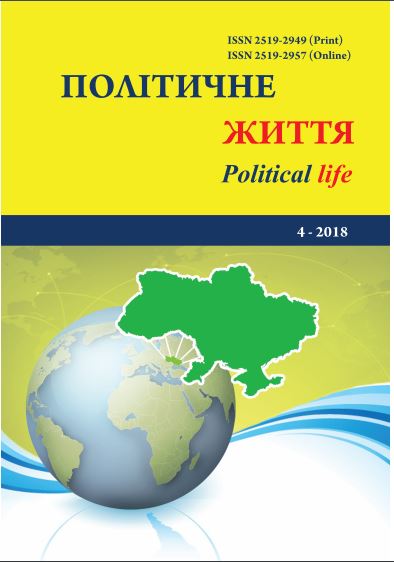Strategy for national memory formation: institutional discussion of V. Yushchenko.
DOI:
https://doi.org/10.31558/2519-2949.2018.4.11Keywords:
Yushchenko, Holodomor, discourse, national memory, OUN-UPAAbstract
This article examines institutional practices through which symbolic texts influence the formation of national memory. Studying the display texts, laws and the nature of monuments. The strategies of forming the policy of national memory are considered. The instability and inconsistency of the national identity policy are emphasized.
National memory is a key component of the collective identity of the state. Different interpretations of historical events risk creating different discourses that conflict with each other. And political institutions, as interpreters of the development of official texts, are responsible for the dichotomy of identical meanings. Symbolic texts, as structures of discourses, consist of arguments, metaphors, phonologies, linguistic, communication and normative acts. They are used through stories, news. This is a condition for the functioning of discourse, through which meaning is created as political diligence. The official political discourse creates a regulation that points to the official text. It relates to topics that are introduced into the public space, with political processes, political leaders, political events, the ideology of the state, etc. All the themes that society has to reflect, are challenging for political power. And the participants in such a discourse are the main actors of political processes: on the one hand – the political elite and political institutions, on the other hand – the public. The purpose of the article is to study political institutions as the main actors of official political discourse, which, through the policy of national memory, produce the collective meaning of the nation. The discovery of symbolic texts, patterns, and the themes that formed the strategy of national memory during the time of President Viktor Yushchenko will reveal the main advantages and disadvantages of forming the necessary directions for the development of this problem in the scientific and institutional space.
References
Президент України. Указ «Про додаткові заходи щодо увічнення пам’яті жертв політичних репресій та голодоморів в Україні». Від 11.07.2005. № 1087/2005. [Електронний ресурс]. – Режим доступу: http://zakon3.rada.gov.ua/laws/show/1087/2005
Президент України. Указ «Про вдосконалення нагородної справи в Україні». Від 18.08.2005. №1177/2005. [Електронний ресурс]. – Режим доступу: http://zakon2.rada.gov.ua/laws/show/1177/2005
Президент України. Указ «Про вшанування жертв та постраждалих від голодоморів в Україні» від 04.11.2005. №1544/2005. [Електронний ресурс]. – Режим доступу: http://zakon5.rada.gov.ua/laws/show/1544/2005
Президент України. Указ «Про заходи у зв’язку з 75-ми роковинами Голодомору 1932-1933 років в Україні». 28.03.2007. №250/2007. [Електронний ресурс]. – Режим доступу: http://zakon5.rada.gov.ua/laws/show/250/2007
Президент України. Указ «Про відзначення у 2007 р. Дня пам’яті жертв голодоморів». 02.11.2007. №1056/2007. [Електронний ресурс]. – Режим доступу: http://zakon5.rada.gov.ua/ laws/show/1056/2007
Верховна Рада України. Закон України. «Про Голодомор 1932 – 1933 років в Україні». 28.11.2006. № 376-V. [Електронний ресурс]. – Режим доступу: http://zakon5.rada.gov.ua/ laws/show/376-16
Веселова О. Пам’ятні знаки і пам’ятники жертвам голоду-геноциду 1932-1933 рр. в Україні // Проблеми історії України: факти, судження, пошуки. 2005. С. 169-179.

